It is with great sorrow and frustration that I say another potentially promising TV show bites the dust. Mere hours before drafting this essay in bed while flipping through TV news, I learned that NBC has cancelled the sci-fi adventure series Timeless. Again. It’s almost as if, for a show about going back in time to repair and safeguard history, this show just couldn’t change its own fate, no matter how vocal and obsessed the fan base (among whom I count myself as a member).
The death knell hasn’t totally rung out just yet—there are talks of one final salvo in order to bring closure to the entire story. Especially considering the big, dramatic cliffhanger of the season two finale—the death of one major character, and the appearance of the badass future versions of two others—as well as all of the season’s still-unanswered mysteries, a lot of people are hoping for more of the story to emerge.
But according to Shawn Ryan, the word is to give the show a finale two-hour movie special.
I say what I’m about to say as a fan, as someone who loves the characters and worldbuilding of Timeless a whole lot, and would do anything to see even more of them next year—
Please, for the love of all that is wholesome and noble on this pale blue dot, can folks just cut it out with the two-hour movie specials to wrap up canceled television plots? First Sense8, which I also loved and hated to lose, and now this?
I don’t mean to be cruel, but does anyone remember Serenity?
Okay, I think I can guess what you’re about to say. “What’s wrong with Serenity? That was a good movie!” And it was. I’m not saying it’s bad—it provably wasn’t. It was good! It was shiny, even! I enjoyed it a hell of a lot!
But… and I don’t know how to broach this topic to fellow Browncoats without a lot of frustration… Serenity isn’t Firefly. Not by a long shot. I’d even go so far as to say that if you put them beside each other, they’d only superficially resemble. Captain Malcolm Reynolds shifts almost suddenly from a snarky, charming rogue to a bitter, churlish old man who hangs up on the film’s call to action as often as the call is made, but somehow still finds himself moving forward within it based solely on reaction, taking the crew of his ship into unnecessary risks on barely any justification, all the while insisting he doesn’t like or want any of it. Why does he take the fugitive brainwashed assassin River Tam on a mission? Why does he seem not adequately bothered by the fact that a kill command can play on any television that can turn River into an unrestrained agent of mass murder? No matter how valuable the information is in theory, why does Mal decide to travel to Miranda if he knows it’s swimming with Reavers and he doesn’t even know what he’ll learn there? Why is this how we learn about the Reavers at all? Why is this the first we’re hearing of a soldier as good as The Operative? Why is his confrontation with The Operative the first we’re even learning about this war injury that renders him immune to pressure-point paralysis when even the earlier points of the film don’t properly establish the wound at all?
Serenity works in large part if you don’t think very much about how much more convenient it would have been to let each individual element of it breathe within a whole season: to let us see what makes Mal so bitter and expose us more to his personal consequences of the war, to step slowly toward the Reaver revelation and more secrets of the Alliance, and to tell a better story about how the access to information undoes despotism.
A movie isn’t that room. In fact, I’d dare say a movie can often do more harm to closure than just leaving a canceled show unresolved.
This goes especially for a show like Firefly, which it seemed was struggling on the production end to win the faith of execs as much as it had the hearts of viewers. Even a cursory read of the history of the show tells the story of execs who thought it wasn’t compelling enough, stripping it of the chance to even tell the full story of its first season, even if literally every episode was a winner in Browncoats’ eyes (yea, verily, even the finale, which I still have… a lot of harsh words for). A closure movie in circumstances like these seems to be the best of both worlds—more story for the people hungry to continue in that world, and less commitment for the folks who don’t want to pay for it any more.
Let’s look more closely at Sense8, for instance. Again, another show I loved, and didn’t want to go away, cut down by production struggles. Allegedly, Netflix figured the high expense required to make such an arresting, aggressively thematic globe-trotting series wasn’t breaking even with the viewership numbers, so they weren’t eager for a season three. Fans rioted on Twitter, and almost immediately a two-hour special was put on the table to tie up loose ends. Season Two, after all, also had a big cliffhanger—just when the entire world of sensates was beginning to be overturned, Wolfgang had been kidnapped, and the cluster had just resolved to bust him out by any means necessary.
What we got, though, was… a good movie. It’s good! I enjoyed it!
Except… what did it do to Capheus, and why did it just conveniently gloss over the fact that he was running for a major election in his home country of Kenya while all of this is happening, and hasn’t been seen by his constituents in days? Why does Lito contribute so little to the film except intense anxiety? While I love that the film gives so much room to develop the relationships between Kala and Wolfgang, and Nomi and Neets respectively, why are those the only ones it seems to value? Why does it attempt to rush through what should be the disturbing realization that so much of Wolfgang’s conflicts within his family are borne from his discovery that he is the offspring of an incestuous sexual assault, only to immediately drop the whole thing and give Wolf no further emotional catharsis? Why does the final confrontation feel so… lackluster?
The answer to all of these questions is, “because the fans deserved a final season”.
Buy the Book
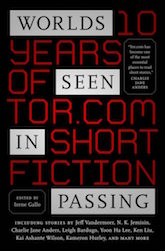

Worlds Seen in Passing: Ten Years of Tor.com Short Fiction
I get if the powers that be don’t want to commit any further to a show they have lost faith in. I get that they want to just put the thing out of its misery without losing the trust of audiences. But at least to me, it would always just be worth more to give a show another smaller season, even if it’s eight episodes, even if it’s six, than to strain the answers into two hours and hope for the best. A television season is a marathon—trying to close it out in one breathless sprint does the story less favors than just killing it. Or, to offer another analogy: if fans came for a full course meal and you tell us you don’t have the ingredients or the hands to prepare it, it’s much better for you to guide us away than to give us a burger and a shake to appease us.
The worldbuilding and character development of Timeless is too big, especially now, to just close with a film. Rufus was murdered, only for future versions of his comrades Lucy and Wyatt to come back to their time and volunteer to bring him back—their very presence breaking a temporal law the team had sworn by for months. The mystery of Garcia Flynn’s secret book containing all the plots and plans of the big bad organization Rittenhouse has yet to be solved, and further, what it implies about Flynn’s relationship with Lucy was barely explored this season in favor of shipping #Lyatt—and I want to be sure, I have no judgments about the ship one way or the other, but story is story, and especially considering that Lucy’s future, battle-worn badass self was staring her in the eye in the season finale, the idea of her actually going back in time just to guide Flynn on this path seems worthy of showing now. Also, Jiya can control her visions now, apparently, which is a big damn deal, especially considering that apparently she also taught herself how to fight?!? And not to mention all of the character potential we were just beginning to plumb the truest depths of regarding Connor Mason, Agent Denise Christopher, and even Rittenhouse agents Emma Whitmore and Jessica Logan the latter of which was Wyatt’s temporally resurrected wife.
Count all of those beats. Just imagine each of them being explored at their very fullest. If you commit even just twenty minutes to breathlessly giving each individual element space to breathe, you’d be wildly over the two-hour mark.
Why tease fans with the idea of telling a good story anxiously when you can just give it room to be told well—or, alternatively, not at all?
A lot of TV seems to be a struggle to balance fans with funds, and it plays out like the behind-the-scenes staff responsible for making these shows happen at all are experimenting with ways to produce the barest minimum viable product and not lose consumer trust. If the two-hour special is that new minimum viable product, I’m not sure that I’m for it. Stories don’t get to grow and flower in such small pots. The small portion of extra effort required to truly fulfill those stories to their best would have been worth it in my mind, not merely to give fans the story at its summit, but to hopefully give them faith that no matter your challenges producing those stories, you can be trusted by them to at least do them justice to the end. Without that, you’re not letting those shows pass on gracefully, you’re leaving them to bleed out in misery.
I want to be wrong. I want to be able to say that if Timeless got a movie special it would be grand and interesting and engaging just like each episode of its first two beautiful seasons. But I can’t lie. I suspect that no matter how enjoyable such a potential movie may be, it would pale in comparison to even six more proper episodes, even four. And I wish I could borrow their Lifeboat and travel back to the very first TV boardroom where the very first person ever thought up the two-hour-movie-special cop-out, and somehow bring them to their senses.
Brandon O’Brien is a performance poet and writer from Trinidad. His work is published or upcoming in Uncanny Magazine, Strange Horizons, Sunvault: Stories of Solarpunk and Eco-Speculation, Arsenika, and New Worlds, Old Ways: Speculative Tales from the Caribbean, among others. He is also the poetry editor of FIYAH Magazine. You can find his blog at therisingtithes.tumblr.com or on Twitter @therisingtithes.











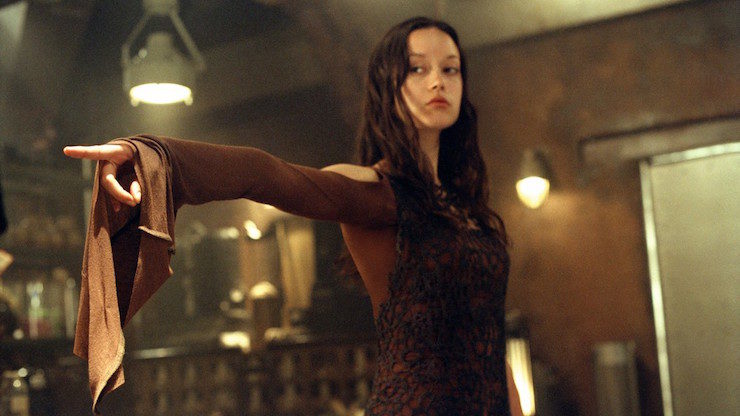
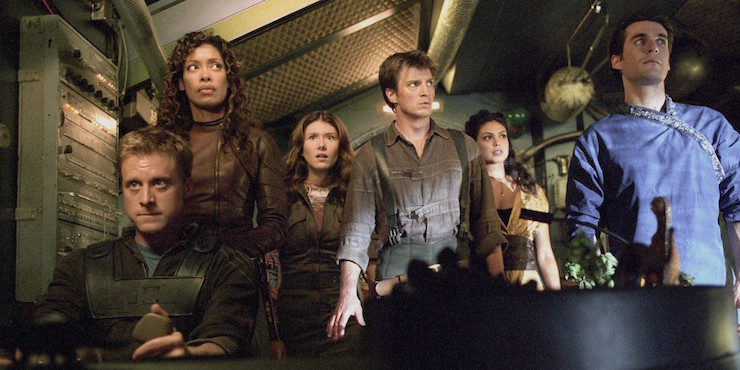
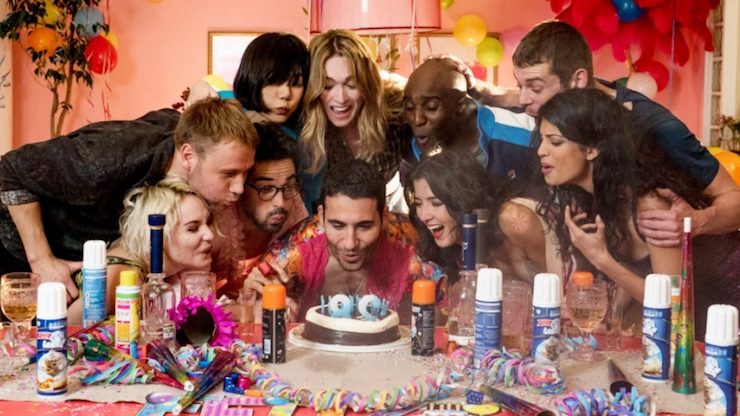
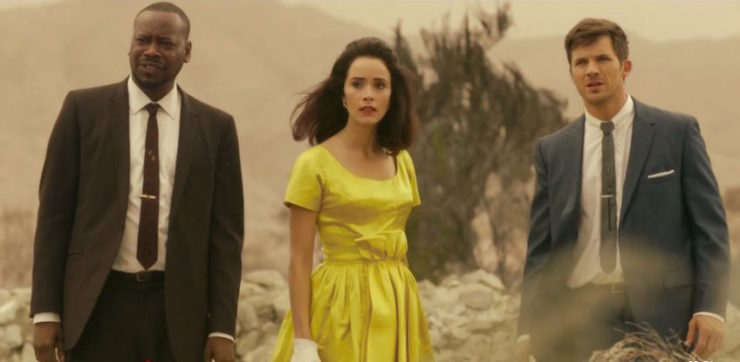
Your points about Serenity were waaaaay off. That is all.
Austin @@@@@ 1 – how do you mean? I don’t have time for a long in-depth response myself, but just curious. There’s a reason I continue to re-watch Firefly and have only watched Serenity once(maybe twice, but if so it was forgettable). The main redeeming factor of Serenity for me was the fact that we got to see the characters live just a bit more before they were gone forever…even though I’m not a big fan of the story that was told.
This is why I’m happy that Person of Interest managed to get a concluding season.
I concur with @1. Specifically:
1. Mal’s characterization in Serenity is completely in keeping with how the show had him. Many episodes showed Mal as being able to make the tough calls, having a dark side that was barely held in check, and yet still doing the “right thing.” Serenity showed what happened when Mal was put through the wringer for 6(ish) months – losing Inara, losing Shepherd, getting lower and lower on money and jobs and options, and being pushed further and further away from civilization by the expanding Alliance.
2. River had shown during the series to be able to read minds to some degree. It is natural that over a 6(ish) month period, more would be revealed and Mal would want her to start “earning her keep.” Especially on a mission like the one at the start of the film.
3. “Not adequately bothered” – that’s an opinion, not fact. I found the level of his reaction to be perfectly in keeping with his character (in fact, it’s why he took River/Simon with as they got the heck out of Dodge, to Jayne’s consternation).
4. Traveling to Miranda is pretty much the only option the crew has by that point in the movie.
5. How else would you suggest that we learn about what caused the Reavers to become Reavers? The mystery is set up beautifully during the tv show, and the revelation is a great payoff.
6. The Operative simply hadn’t been brought in yet. The Hands-of-Blue guys were on the mission, and were determined to have failed at some point between the end of the tv show and the beginning of Serenity. This is not really very hard to understand.
7. Why would we have learned about the nerve cluster that Mal had moved? I mean, that whole sequence is bothersome in that it’s kind of a cop-out, but that’s nothing that would have been “solved” by having the story play out over a second season instead of a 2-hour movie.
There are plenty of things “wrong” with Serenity, but to claim that it does anything less than a stellar job of wrapping up a TV show that had been cancelled is a tough sell. Serenity is an example of closing a series properly, not vice-versa.
I agree with your points on Serenity – as glad as I was to have it exist, I had similar problems with the plot; I can only assume it was an attempt to both wrap up the show and create a standalone story given that it was being shown on the big screen rather than on tv.
I’d also raise the long-awaited wrap up of Farscape as having similar issues. It got three hours and that wasn’t nearly enough for the plot lines that they wanted to cover – though I’d argue not having it would have been even worse…
Why would we have learned about the nerve cluster that Mal had moved? I mean, that whole sequence is bothersome in that it’s kind of a cop-out, but that’s nothing that would have been “solved” by having the story play out over a second season instead of a 2-hour movie.
This is the only criticism of Serenity that I agree with. And it would have been very easy to solve.
We already knew Mal was a war veteran. All it would have taken would be an offhand reference at the start of the film to his having been seriously wounded. We could have had Zoe say something like “ever since you came out of hospital after the war…” We could have had him jokingly referring to his war wound still causing him pain. We could have had a sight of some dramatic scarring on his lower back at some point. You’d have half-forgotten it by the time he fought the Operative, but you’d remember when he mentioned it. As it was, it came completely out of the blue.
Other shows that got concluding movies that needed a whole season:
StarGate: SG1 got TWO movies to wrap up the show, but arguably, the whole thing should have ended after the perfect ending to Season 8 anyway.
The Pretender. That movie was so awful, they canceled a planned sequel.
Shows that got final, shortened seasons instead after they got their pink slips:
Fringe, Alias, Person of Interest. Those shows all have something in common that likely led to the final 0-12 episodes being granted, and the endings were pretty good.
Chuck, also. I wasn’t ready for that show to be done, but it was a decent ending.
Farscape got 2 two hour movies to wrap things up, after half a dozen years break…
@@.-@,
Never bought the nerve cluster thing. 1) can you actually full-body paralyze someone by poking them there? If you could, that would have saved me a lot of time in karate training. 2) can you move a nerve cluster?
I started with ‘Serenity’ and promptly went out and bought the series. I couldn’t see any real disconnect between the two.
10. princessroxana Same. I went to the theater and saw it and promptly bought the series on DVD. While I enjoy the series a bit more (more characterization), I always conclude my rewatches with Serenity.
Anthony Pero @7, which movie do you mean as cancelled? Because there are two The Pretender movies: The Pretender 2001 and The Pretender: Island of the Haunted.
Other than that, I kinda agree – I adore the series (still my all-time THE FAVOURITE series), but they seemed to have written themselves in the corner and instead of clearing things up, whereas TP 2001 confused them a bit more, TP: IOTH ran totally off with everything (if I remember correctly – I continuously rewatch the series, but have watched the movies only once or twice, and that too a long time ago).
I also started with Serenity and then went on to Firefly. I preferred the grim Mal of Serenity to the charming rogue of Firefly who had the armed robber’s willingness to murder people who don’t cooperate.
But for sure, Serenity could have been developed into an entire season of its own.
If there’s a consistent issue here, I don’t believe the “wrap-up” aspect has much to do with it; more important are the general frictions between the storytelling dynamics of TV vs. feature-length films. Perhaps a return to the two- or three-night, sweeps-week “event” miniseries from the heyday of big-3 network TV might provide a viable middleground for closing out these sorts of shows?
Indeed, I’m struggling to think of TV series with associated feature-length films—whether for TV or theatrical release, finales or not—where the result didn’t change the feel in some noticeable way. The one that comes to mind as having worked best, with a movie release that worked well as both a stand-alone film and as an extended episode, is, well…Firefly & Serenity!
I’ll take a two hour wrapup over the alternative. (Especially with regards to Farscape.) You won’t get another season, that’s better than jack shit.
It seems that what you’re arguing, or fanatically cheering for, is an endless show. And you have Friends and such for that matter.
As mentioned, Serenity happens a bit of time after Firefly, and Mal and the crew are strained to their limits, having no options, thus acting in ways that you could think don’t really fit with Firefly… but they do if you realize they don’t happen right afterwards.
For sure Serenity was a terrific and well thought wrap up.
If anything, the music is what doesn’t fit (though the Serenity theme gives chills), being from another composer, and maybe the photography—Serenity being colder and Firefly warmer.
The two hour movie isn’t perfect, but when the other option is nothing? I’ll take the movie every time.
@12:
I only remember Island of the Haunted.
@16, 17:
I don’t think so. I think what is being argued for–and the viable alternative–is that instead of dropping relatively successful shows with a relatively large and passionate fan base–and ongoing narratives–cold, or providing a straight-to-DVD movie-of-the-week quality two hour wrap up, give the show a limited 6-10 episode arc to allow the writers to wrap the show up properly. In my comment @7 I listed four shows that did exactly that. They provided planned exits for bubble shows that had passionate fan bases instead of dropping them cold. In three of those four cases, they were Bad Robot Productions, which is telling–Fox, and other networks, learned from the mistakes Fox made with Joss Whedon (who will no longer work with Fox), and chose not to piss off the exec of an extremely successful production factory and possibly miss out on future hits.
Its not like these shows aren’t making money. Its that they have shrinking audiences, and the networks have to drop something in order to allow room for new shows that have a chance to possibly exceed the ratings of the existing shows. And I think now that 10-12 episode seasons are becoming more popular on the networks, we’ll see more shows (especially ones with serialized narratives) get limited-run endings instead of dropped cold. Its easier to pair a limited run series’ time slot with a new show that only runs 12 episodes. As far as the streaming services go, Netflix has no excuse. They spent $200 million on Bright, for God’s sake. They could have chosen to give Sense8 a 4-6 episode sendoff.
Firefly is an outlier on this list, as the network was never sold on the show to begin with, mismanaged its promotion form the start, and the show never really found an audience until it was released on DVD–long after it was cancelled, and many of the actors had moved on to greener pastures.
All this debate over Serenity hasn’t convinced me one way or another.
But you have made me sad about losing Firefly all over again. Thanks a lot
I think this argument works best with Farscape. They had a fifth and final season planned out, and they ended the forth season with a cliff hanger, and then got cancelled (still bitter).
The film(s) that we did get were great, but it’s clear from watching them that they tried to shrink the entire season down to 3-4 hours, and a lot of stuff just didn’t fit properly (for example, Aeryn’s accelerated pregnancy presumably would have happened at a more normal pace).
Like everyone else, I’m glad we got an ending, but I’d have preferred an entire series to wrap up all the side plots and individual characters.
I think the major thing people forget, is the power of an exec who keeps a show because they like it. Take Star Trek TOS, Lucile Ball kept that show even when they were going to cancel it. If we had more people who worried about the entertainment value, than the dollar value we might not need to rush-wrap stories that deserve better. There was a show called Happytown that got 8 episodes, I liked the dark mystery of the show, just when it was getting good is when the story was dropped. Also the way we gauge viewer interest is strange. Why are we not looking for advertisers who will support the shows rather than advertisers who want to controll what is on. As for the mini-season vs. 2 hr. wrap vs. nothing, I will take a 2 hr. Wrap to nothing, but will always go for a mini-season.
A couple instructive examples of the impact of even threatened cancellation have occurred to me. Babylon 5 was nearly cancelled a season early, but since JMS not only had the full story mapped out but had also pre-planned various ‘trapdoors’ for characters and subplots for separate pragmatic reasons, the pacing of the final 1.5 seasons was affected more than the content. Battlestar Galactica was cancelled in the middle of its last season, then allowed to complete it; since the creators had at least a vague sense of where they wanted to go, they were able to first craft a mid-season finale that could have served as an effective (if bleak) series finale, then were able to build on it to put together a coherent final arc to close out the series more cleanly. (I’m only claiming that BSG did wrap up their storylines, please don’t hijack the thread to argue about whether you liked the way they did it! :-)
So, while it is easy to bash executives and producers for causing good shows to close out with a whimper or a thud, it seems to me that some of the blame needs to be placed on the writers too; if nothing else, such cases reveal writers who seem ignorant of their industry’s history. Perhaps good advice for writers should be: don’t start a multi-episode, complex story arc unless you are in possession of not only an idea of how you want it to end but also a contingency plan for wrapping it up on short notice. (Corollary: don’t write a cliffhanger without a signed contract guaranteeing at least one more episode!) I wonder if it would be possible for future development contracts to include some clause requiring X number of episodes to be written and produced following a decision to cancel the series. Even if a 3-4 episode finale arc ended up abridged into a two-hour movie, it might still be decent if the writers knew from the start of the series that they might need to go that route one day.
Three more shows that closed their runs with short final seasons were Warehouse 13, Grimm, and Bones. Though in the case of WH13 it’s like they put 7 episodes of the final season into the extended 20 episode 4th season.
Eureka did a similar thing, extending the 4th season to 21 then dropping the 5th back to 13 episodes.
The last season of Warehouse 13 was so awful I wish it hadn’t existed. At least a movie would have presumably lacked the amount of time necessary for the plotline that betrayed many seasons worth of relationship between the two leads.
@19 Of course a shortened season would be better, but the reality is that in many cases getting a 2 hour movie after being abruptly canceled (or in Timeless’ case – canceled twice!) is a minor miracle. My order of preference for wrapping up a show would be full final season, shortened final season, mini-series, then 2 hour movie over nothing.
Whedon once said that if he were to somehow, for some reason, be able to do another season of Firefly, he’d probably ignore the events of Serenity. (This was before Ron Glass died.) So with that in mind, I figure fans can accept or reject the film as canon. Serenity was a fine film, but it didn’t feel like a wrap-up to Firefly. It felt like a reunion movie set in the same universe. I love the movie for what it is, but I’ve also become more critical of it in the years since it was released.
Case for wrapups – Dollhouse https://www.imdb.com/title/tt1135300/
The episodes were hit or miss – you have to watch them to know the characters – but them eptaph one – when they thought they’d be canceled after the first season – the epitaph two (even better!) when they actually were cancelled after the 2nd season – like I said, you have to go through the often mediocre episodes in the season to know the characters – but then the pay-off and unexplained but implied twists and character development that happens in the epitaphs! (Which take place in the future of both season one and two).
i agree this new model of season-by-season binge tv needs to work out this problem. Either have a basic ending (with some looseness) each season or have some shortened season ending escape hatch as mentioned. Or we’re going to be seeing a LOT of this bs in the future.
Two hours is not a season, and parts are necessarily going to have to be given short shrift in order to fit the main arc in the two hours. Nitpicking on that isn’t really saying anything we don’t already know.
But you’re missing the value of wrapups like this: they give the fans just enough to fill in how it would have gone, if they had had an actual season (or more) to flesh out that story arc. I absolutely want to have that, and not just have the ideas be lost.
I’ve always said that once I become god-emperor, one of my first edicts would be to institute a “Closure Clause” in all network contracts, punishable by job cancellation. If it lasts more than a season, it deserves at least a few more episodes to finish the story. We have to (usually) watch 1/3 of the show as commercials in everything they air, so we deserve at least a third of a season for wrapping up the entertainment. Otherwise, without a complete story, we’ve just been duped into paying attention to their revenue stream for as long as it was useful to them.
Another show that got truncated was the excellent Canadian sci-fi show, “Continuum”. They got a shortened final season, but so many of the threads were just snipped and cauterized to fit in. The plot was mostly self-consistent, but it was missing a certain… philosophical element. A character whose appearance had long been teased got shoehorned into a few semi-mystical seconds, and it felt like the last couple episodes were time-prioritized edited chunks of a larger arc, which is exactly what it was. I’d love to know what the writer originally had planned, as he, too, was disappointed that his vision was unable to be fully realized. Now, however, no one will ever know the centuries-spanning conclusion he had in mind, and that is a tragedy. When well-written shows are not allowed to complete their arcs, writers, actors, and especially fans are the ones who suffer, while network execs and advertisers continue to reap the fruits of our attention. Until that hypocrisy ceases, I feel zero compunction in finding a copy online that removes the commercials altogether, even though I usually let my TiVO tune in during the airing of the show, or stream the show from the network, so as to give the viewer ratings my support.